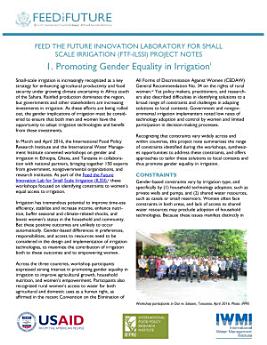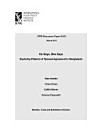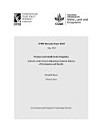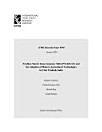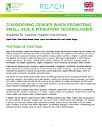Promoting gender equality in irrigation
Theis, Sophie · Passarelli, Simone · Bryan, Elizabeth · Lefore, Nicole · Deneke, Seblewongle · Nyamadi, Ben · Mlote, Sophia
জুল ২০১৬ · Intl Food Policy Res Inst
ই-বুক
4
পৃষ্ঠা
family_home
উপযুক্ত
info
reportরেটিং ও রিভিউ যাচাই করা হয়নি আরও জানুন
এই ই-বুকের বিষয়ে
Small-scale irrigation is increasingly recognized as a key strategy for enhancing agricultural productivity and food security under growing climate uncertainty in Africa south of the Sahara. Rainfed production dominates the region, but governments and other stakeholders are increasing investments in irrigation. As these efforts are being rolled out, the gender implications of irrigation must be consid-ered to ensure that both men and women have the opportunity to adopt irrigation technologies and benefit from these investments.
ই-বুকে রেটিং দিন
আপনার মতামত জানান।
পঠন তথ্য
স্মার্টফোন এবং ট্যাবলেট
Android এবং iPad/iPhone এর জন্য Google Play বই অ্যাপ ইনস্টল করুন। এটি আপনার অ্যাকাউন্টের সাথে অটোমেটিক সিঙ্ক হয় ও আপনি অনলাইন বা অফলাইন যাই থাকুন না কেন আপনাকে পড়তে দেয়।
ল্যাপটপ ও কম্পিউটার
Google Play থেকে কেনা অডিওবুক আপনি কম্পিউটারের ওয়েব ব্রাউজারে শুনতে পারেন।
eReader এবং অন্যান্য ডিভাইস
Kobo eReaders-এর মতো e-ink ডিভাইসে পড়তে, আপনাকে একটি ফাইল ডাউনলোড ও আপনার ডিভাইসে ট্রান্সফার করতে হবে। ব্যবহারকারীর উদ্দেশ্যে তৈরি সহায়তা কেন্দ্রতে দেওয়া নির্দেশাবলী অনুসরণ করে যেসব eReader-এ ফাইল পড়া যাবে সেখানে ট্রান্সফার করুন।
